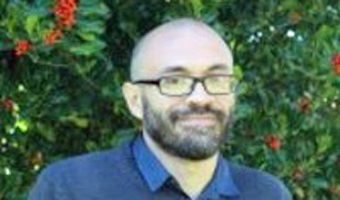Ohio University alumnus Dr. Sebastian Hurtado Torres, Assistant Professor of History at Universidad Austral in Valdivia, Chile, published two major articles on Chile during the 1970s.
Both of his articles explore political developments in Chile in the context of the larger Cold War. The first is titled: “The War that Didn’t Break Out: Military Rule and Regional Tensions in the Andes in the 1970s” and was published this summer in The International History Review. Dr. Torres’ other article came out in the Journal of Cold War Studies and is titled: “The Chilean Moment in the Global Cold War: International Reactions to Salvador Allende’s Victory in the Presidential Election of 1970.” CHI would like to congratulate Dr. Torres for publishing these excellent articles in two prestigious journals.
Hurtado-Torres earned a Ph.D. in History in 2017 from the College of Arts & Sciences at Ohio University. He also earned a Contemporary History Certificate, which helped prepare him for his work as an educator and researcher.
In addition to teaching courses at Universidad Austral, Torres has contributed to the Chilean Foreign Ministry’s investigation into an international legal dispute between Chile and Bolivia, which was concluded last year in Chile’s favor. His book The Gathering Storm: Eduardo Frei’s Revolution in Liberty and Chile’s Cold War is being published by Cornell University press next spring.
To highlight these recent articles, CHI is taking this opportunity to re-run the following April 2018 interview with Dr. Torres.
The Contemporary History Institute caught up with Torres recently about what he has been doing.
You are currently teaching at Universidad Austral de Chile in Valdivia as the equivalent of an assistant professor in the U.S. What classes are you teaching at the moment?
At Universidad Austral I teach the 19th- and 20th-century Chilean history courses, a seminar on political history for senior students, a course on world history since 1776, and a grad course on current historiography, in tandem with another colleague. In other universities I’ve taught courses on U.S. foreign relations and Latin American history.
In addition to your teaching responsibilities, you are working with a group of historians assisting the Chilean Foreign Ministry on a case being looked at by the International Court of Justice. What does this case entail, and what do you and your fellow historians bring to the table in this kind of project?
The case was brought to the court by the government of Bolivia, which claims that Chile is under an obligation to negotiate with Bolivia in order to grant the latter an outlet to the sea. Bolivia is a landlocked country since the end of the War of the Pacific in the 19th century, in which Chile occupied and annexed Bolivia’s coastal province. This was sanctioned by a treaty in 1904. During the 20th century, Chile and Bolivia talked in several occasions about this matter, and in more than one opportunity Chile manifested its willingness to consider granting Bolivia sovereign access to the Pacific Ocean through a corridor in territories that formerly belonged to Peru (which was defeated in the War of the Pacific, too). As historians, we were requested to provide information about the historic context in which Chilean-Bolivian relations have unfolded since independence and, in my case, doing research in Chilean and U.S. archives for that purpose. I wrote a number of reports on different aspects of the relation between both countries and passed on the Chilean juridical team many documents I’ve found in my own research.
You doctoral dissertation has been reviewed favorably by Cornell University Press and is in the early stages of becoming a book. What is the focus of your research and where did you acquire your source material?
The manuscript is an improved version of my dissertation, titled “The Gathering Storm: The United States, Eduardo Frei’s Revolution in Liberty, and the Polarization of Chilean Politics, 1964-1970.” It deals with the involvement of the United States, especially through its embassy in Santiago, in Chilean politics during the Frei administration. For the dissertation, I visited and gathered material from the National Archives II, the John F. Kennedy and the Lyndon B. Johnson presidential libraries, the Historical Archive of the Chilean Foreign Ministry, and the Eduardo Frei Library, among others. I am currently collaborating with my Chilean mentor, Dr. Joaquin Fermandois, on a research project on South American international relations in the 1960s and 1970s. For this project, I have visited the Richard Nixon, Gerald Ford, and Jimmy Carter presidential libraries in the U.S., the Archive of the Brazilian Foreign Ministry and the National Archives of the UK.
How did your experience at the Contemporary History Institute help get you established in your current profession?
CHI contributed significantly to my professional development. The courses that composed the Contemporary History certificate allowed me and my classmates to reach a deeper understanding of some issues that are crucial to our discipline, such as particular methodological approaches and critiques of the field. In a more practical way, CHI contributed with generous funding for some of my research trips and gave me a fellowship when my Chilean-government scholarship ran out. The facilities the CHI had at my time in Athens were also of great help for working and also socializing with other CHI students. That social and intellectual exchange made my time in Athens a very happy one.




















Comments